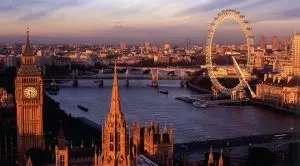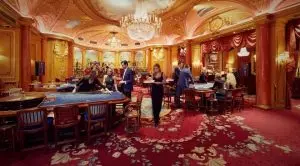 A new study shows one-fifth of all gambling venues in the United Kingdom are located in the areas with the lowest income. The study conducted by the University of Bristol, with backing from the Standard Life Foundation, has also found sports wagering shops are ten times more prevalent in poorer towns than they are in areas where the standards of living are higher. According to the study, some of the cities with the largest number of bookmaking facilities include Middlesbrough, Glasgow, London, and Liverpool.
A new study shows one-fifth of all gambling venues in the United Kingdom are located in the areas with the lowest income. The study conducted by the University of Bristol, with backing from the Standard Life Foundation, has also found sports wagering shops are ten times more prevalent in poorer towns than they are in areas where the standards of living are higher. According to the study, some of the cities with the largest number of bookmaking facilities include Middlesbrough, Glasgow, London, and Liverpool.
As much as 21% of the gambling facilities are located in areas in the bottom tenth of the UK based on deprivation. By contrast, a meagre 2% of the facilities are found in the top 10% of the least poor regions of the country.
The number of betting premises has been on the decline in recent years. Nevertheless, the country still has more gambling facilities than large-chain supermarkets, the research has shown. What is more concerning is that half of the problem gambling treatment facilities in the country are located within 250 metres of their nearest betting premise.
What is more, 10% of the British schools are five minutes away from a betting facility. As many as 742,000 students from over 2,000 schools in the UK are exposed to the risk of problem gambling. Gambling addiction is a public health issue that can seriously damage an individual’s social relations, finances, and income, according to Mubin Haq, who heads the Standard Life Foundation.
Poorer Areas Have More Betting Venues than Supermarkets
 Poorer individuals are targeted by gambling operators more, having twice as many gambling facilities in their areas as supermarkets, Mr. Haq proceeds. He also suggested that the pending gambling reforms should consider the geography of the gambling premises and grant greater power over licensing to local authorities.
Poorer individuals are targeted by gambling operators more, having twice as many gambling facilities in their areas as supermarkets, Mr. Haq proceeds. He also suggested that the pending gambling reforms should consider the geography of the gambling premises and grant greater power over licensing to local authorities.
The majority of Brits, or 44%, preferred to bet in landbased locations even before the coronavirus pandemic and its associated lockdowns, collectively spending £5 million in betting facilities. The results of the new research clearly indicate the discrepancies in the amenities available to poorer and more affluent communities in the country, says Jamie Evans, who works as a research associate at the University of Bristol.
Instead of having easier access to amenities and services that can improve their quality of life, people from more deprived areas face choices that can potentially harm them. For example, only 10% of all grocery stores in the UK are found in the poorest regions. In the meantime, such economically deprived areas are home to 34% of the country’s amusement arcades, 29% of the adult gaming facilities, and 30% of the bingo halls.
BGC Argues the Gambling Industry Helps Create Much Needed Employment
 According to the Betting and Gaming Council (BGC), an association that represents gambling businesses in the UK, bookmaking shops and gaming venues contribute significantly to the local economy. A spokesperson for the BGC said member operators contributed £4.5 billion in tax money that goes toward essential public services.
According to the Betting and Gaming Council (BGC), an association that represents gambling businesses in the UK, bookmaking shops and gaming venues contribute significantly to the local economy. A spokesperson for the BGC said member operators contributed £4.5 billion in tax money that goes toward essential public services.
Additionally, the industry supports 119,000 job positions and generates £7.7 billion for the British economy in gross value. The BGC also stressed that sports betting facilities alone provide employment for approximately 46,000 individuals across the UK and generate £1 billion in annual taxes that go toward Her Majesty’s Treasury. Gaming venues, in comparison, account for £500 million in taxes each year, employing 11,000 people.
However, Mr. Evans from the University of Bristol believes this is not good enough. While he agrees the industry provides much-needed jobs in poorer areas, it usually does more harm than good. The senior research associate says gambling can cause a range of financial, health and social issues that affect not only problem gamblers themselves but also those who are closest to them.
- Author


